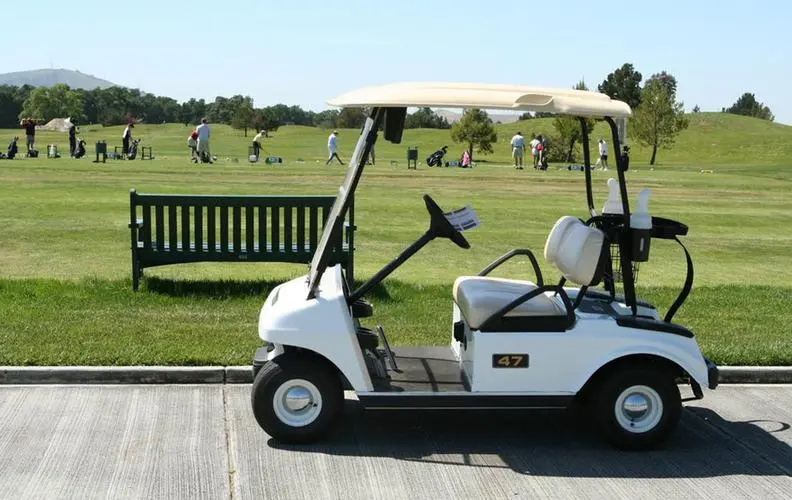 |
Welcome To Evlithium Best Store For Lithium Iron Phosphate (LiFePO4) Battery |
 |

As lithium golf cart batteries continue to gain popularity, they're gradually replacing traditional lead-acid options. If you've been considering an upgrade but are unsure about the benefits, this comprehensive guide will provide valuable insights into why lithium batteries are becoming the go-to choice for golf carts.
Lithium golf cart batteries are advanced power sources specifically designed to support the demands of electric golf carts. Most electric golf carts operate on 36 or 48 volts and draw between 50-70 amps while cruising at around 15 mph. It's important to note that the current draw significantly increases during acceleration or when climbing hills, which can lead to performance issues if the battery isn't capable of supplying sufficient power.
These batteries are deep cycle in nature, meaning they can handle repeated discharge and recharge cycles without significant degradation. Typically, golf cart batteries come in a 12-volt configuration, which can be connected in series to achieve the desired voltage. For example, connecting three 12-volt batteries provides 36 volts, while four batteries yield 48 volts. Many users now opt for ready-made 48-volt batteries available from manufacturers like ELB, which simplifies the purchasing process.
A critical aspect of battery performance is capacity. The more capacity a battery has (measured in amp-hours), the longer it can provide power before needing a recharge. Higher-capacity lithium batteries can significantly extend the lifespan of your golf cart, allowing for longer rounds on the course or more extensive use in other applications.
The functionality of lithium batteries is based on the movement of lithium ions between the anode and cathode. During discharge, the anode releases lithium ions to the cathode, creating a flow of electrons that generates electric current. When the battery is charged, this process reverses, with lithium ions returning to the anode. This efficient flow of ions is what makes lithium batteries superior in performance compared to traditional lead-acid batteries.
One of the most compelling reasons to switch to lithium is their impressive lifespan. Lithium batteries can last for up to ten times the number of cycles compared to lead-acid batteries. This longevity not only translates to lower replacement costs over time but also minimizes downtime, making them ideal for frequent golfers or heavy users.
Lithium batteries are significantly lighter than lead-acid batteries—often weighing about 50% less. This reduction in weight can lead to improved efficiency and performance for your golf cart. A lighter battery can enhance the cart's speed, acceleration, and overall handling.
Safety is a key concern when it comes to batteries. Lithium batteries can be discharged down to 20% of their capacity without damage, which is a major advantage over lead-acid batteries that should not be discharged below 50%. Additionally, many lithium batteries come equipped with a built-in failsafe switch that prevents over-discharge, ensuring longevity and reducing the risk of battery failure.
One of the standout features of lithium batteries is their ability to charge rapidly. They can charge up to four times faster than lead-acid batteries due to their low internal resistance. This means less waiting time between rounds or trips, allowing for more use and enjoyment.
When selecting the right lithium battery for your golf cart, there are several key factors to consider:
While lithium-ion batteries are the most common, you may also encounter lithium iron phosphate (LiFePO4) batteries, which offer enhanced safety and thermal stability. Understanding the differences can help you choose the best fit for your needs.
Most golf carts operate on a 48-volt system, but it’s essential to check your specific power requirements. Some carts may still require a 36-volt configuration. Make sure to match the voltage of your new battery with your cart’s system.
Capacity is crucial for performance. A higher amp-hour rating means more energy available for your cart. For most golf carts, at least 100 amp-hours is recommended, but for longer trips or heavier usage, 120 or 150 amp-hours can be more beneficial.
Ensure that the battery fits the designated space in your golf cart. A battery that is too large can cause installation issues, while one that is too small might not provide adequate power. Always measure the battery compartment before purchasing.
Proper maintenance is vital to extend the lifespan of your lithium batteries. Here are some essential tips:
Regular maintenance helps keep your battery in optimal condition:
By understanding the benefits and features of lithium golf cart batteries, you can make an informed decision that enhances your golf cart's performance and longevity. With proper care, a lithium battery can provide reliable power for many seasons of golfing enjoyment.
Edit by paco
All Rights reserved © 2025 Evlithium Limited